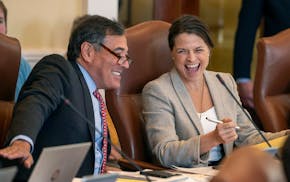WASHINGTON - In Minnesota's Fifth Congressional District, Republican candidate Chris Fields wants to make this fall's election a referendum on race.
Fields is black. So is his opponent, Democratic U.S. Rep. Keith Ellison, who is seeking a fourth term.
Fields claims Ellison has failed black constituents in what is the most ethnically diverse district in the state, a claim Ellison rejects.
Fields' approach is part of a Republican strategy being used in congressional districts across the country, from Oakland, Calif., to Memphis: Challenge black incumbents on racial issues by running black candidates against them.
"It would be impossible for a white candidate to make the same kind of appeal," said University of Wisconsin political science Prof. David Canon. "The Republicans have increasingly done that over the last couple of election cycles."
At least 30 black Republican candidates ran for Congress in 2010, the most in more than a century, and at least half that many are on ballots in 2012. Not all the candidates are challenging black incumbents, but it's a common theme.
Party operatives hope the black candidates can slowly chip away at party loyalty in Democratic-leaning districts like Minnesota's Fifth, Canon said, where almost 30 percent of the district's residents are non-white.
In an online video, Fields tells viewers: "Vote for this black guy [himself], not that one," pointing to a smaller picture of Ellison. Another online video questions Ellison's commitment to lowering black unemployment.
Yet in other statements, Fields has downplayed the race issue, saying he won the Republican nomination because he was the best candidate. "I don't believe race matters in choosing your elected officials," Fields wrote in a recent letter to supporters. "If it did, black people in Minneapolis would be much better off ..."
Ellison, who represented north Minneapolis -- one of the poorest parts of the city -- as a state legislator, questioned Fields' motives.
"I don't think he's doing it for authentic reasons," Ellison said. "Has Chris ever been to north Minneapolis?"
Minnesota Republican Party Chairman Pat Shortridge said the party did not encourage Fields to focus on race in his campaign.
"Chris has done remarkably well for a Republican candidate in the Fifth District ... but sometimes you've got to take some risks in a race like this," Shortridge said. "He's trying to make the point that we have to try something different there because what we've been doing hasn't worked."
With its mix of minorities, college students and young professionals, the Fifth District is reliably Democratic and considered one of the safer Democratic seats in the country.
"For a Republican, it's a hopeless, quixotic campaign," said David Wasserman, who tracks congressional races for the Cook Political Report.
North Minneapolis in focus
So far, Fields' strategy and message have failed to resonate with donors.
Through the end of July, Ellison had a 10-to-1 fundraising advantage. In September, a former campaign consultant sued Fields, claiming he refused to pay the agreed-on salary.
Fields had already faced long odds in his attempt to defeat an incumbent. During re-election bids in 2008 and 2010, Ellison won more than two-thirds of the vote. Democrats have represented the Fifth District since the early 1960s.
Ellison's profile also has risen in the past two years. He is a frequent cable talk show guest, championing liberal causes, and offering perspective on developments in the Middle East from his vantage point as the first Muslim elected to Congress.
Fields said that spotlight has shifted Ellison's focus away from the Fifth District, especially north Minneapolis.
The education and employment disparity for minorities there, and across most of the district, are deplorable and have only worsened "on Ellison's watch," Fields said. "He cannot get the job done."
On issues ranging from education to employment and housing to health care, Ellison said his record is proof that he's attuned to the needs of his constituents.
"Ask around north Minneapolis about who's been there and who hasn't," Ellison said. "But I'm fighting for the whole district. We have never tried to separate people based on race."
Minneapolis City Councilman Don Samuels, who represents part of north Minneapolis, said Ellison is visible in his district. Samuels has met Fields, but is not aware of work he's done in the area.
"[The issues] happened on all our watches," he said. "We all have to take responsibility."
Ellison doesn't expect Fields' tactics to sway voters.
A black candidate, Barb Davis White, also won the Republican Party endorsement to challenge Ellison in 2008. That year, Ellison won in a landslide, capturing 70 percent of the vote.
"If [Fields] believes that the only reason people voted for me is because I'm black, that's not the case," Ellison said. "It's just not that kind of place."
Corey Mitchell is a correspondent in the Star Tribune Washington Bureau. Twitter: @CMitchellStrib
Nancy Pelosi book, 'The Art of Power,' will reflect on her career in public life
Former Wisconsin Democratic Rep. Peter Barca announces new bid for Congress
The Latest | Jury selection enters a pivotal stretch as Trump's hush money trial resumes

